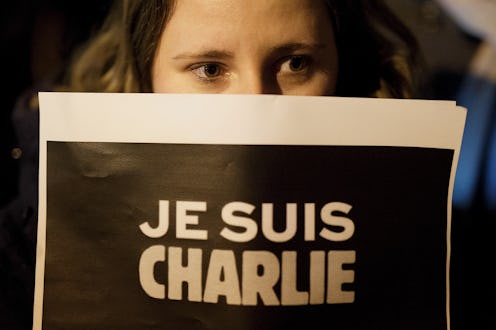News
The Attack On 'Charlie Hebdo' Attacked Free Speech
Journalism often takes many different forms — news stories, television broadcasts, opinion articles, and yes, even satirical cartoons. And with protection of freedom of the press and freedom of speech under the First Amendment, journalism must be defended from attack, no matter what form that journalism takes. By killing at least 12 people at French satirical newspaper Charlie Hebdo , which has published controversial cartoons criticizing religion, police, and politicians, the three gunmen made a clear attack on both journalism and free speech.
It's not even close to the first time that satire and its purveyors have been the targets of physical attacks and threats. In June, North Korea threatened to retaliate if satirical film The Interview was released and then months later committed a cyberattack against Sony Pictures Entertainment, according to the FBI.
One of the most well-known instances of backlash against satire was in 2006, when Danish newspaper Jyllands-Posten published several images of Muhammad, which sparked outrage, boycotts, and protests across the Middle East. Months later, South Park aired two episodes called "Cartoon Wars" that were inspired by the reaction and criticized Comedy Central's refusal to include a depiction of Muhammad on the show for fear of "getting blown up."
Satire holds a prominent place in U.S. culture. The Onion dominates social media with consistently funny headlines that sometimes are a little too on point, and Jon Stewart is considered a mix between a satirical comedian and a trusted journalist. In other countries, such as France, satire plays just as big of a role. Some of the celebrated Charlie Hebdo cartoonists who were killed in Wednesday's attack had been famously commenting on authority since the 1960s. Tim Wolff, the editor-in-chief of a German satirical publication, Titanic, spoke to Deutsche Welle in an interview, stating:
If you shoot at satirists, you only make our work more relevant. ... Of course, on the personal level, we are scared when we hear about such violence. However, as a satirist, we are beholden to the principle that every human being has the right to be parodied.
Nahrain Al-Mousawi, a writer for Canada's The Globe and Mail, says Islamic countries in the Middle East have long used satire as a way to mock extremism. Caricatures, soap operas, musical parodies, animations, and theatrical plays all use satire to criticize extremism and ISIS, especially.
Though satire of religion often gets the most press, it's not the only topic that satirists take on. The Onion alone has made fun of all kinds of politicians, races, genders, sexual orientations, abilities — there has to be at least one article on the website that each person in the world would feel slightly personally offended by. But though some people take personal offense to articles, cartoons, or comments, there's a realization that no matter what is being said, it's not only that person's right to say it, but it's a journalistic tool that provides a unique perspective on the issues.
Salman Rushdie, a British Indian novelist whose work prompted Iran's ayatollah to issue a fatwa for his assassination, issued a statement condemning religious totalitarianism that leads to tragic consequences.
I stand with Charlie Hebdo, as we all must, to defend the art of satire, which has always been a force for liberty and against tyranny, dishonesty and stupidity.
The journalism represented through the satirical cartoons of Charlie Hebdo were necessary, important, and worthy of protection. Whether or not the content is palatable to one's personal taste, the values satire represents are ones that need defense.
Images: Comedy Central Productions
